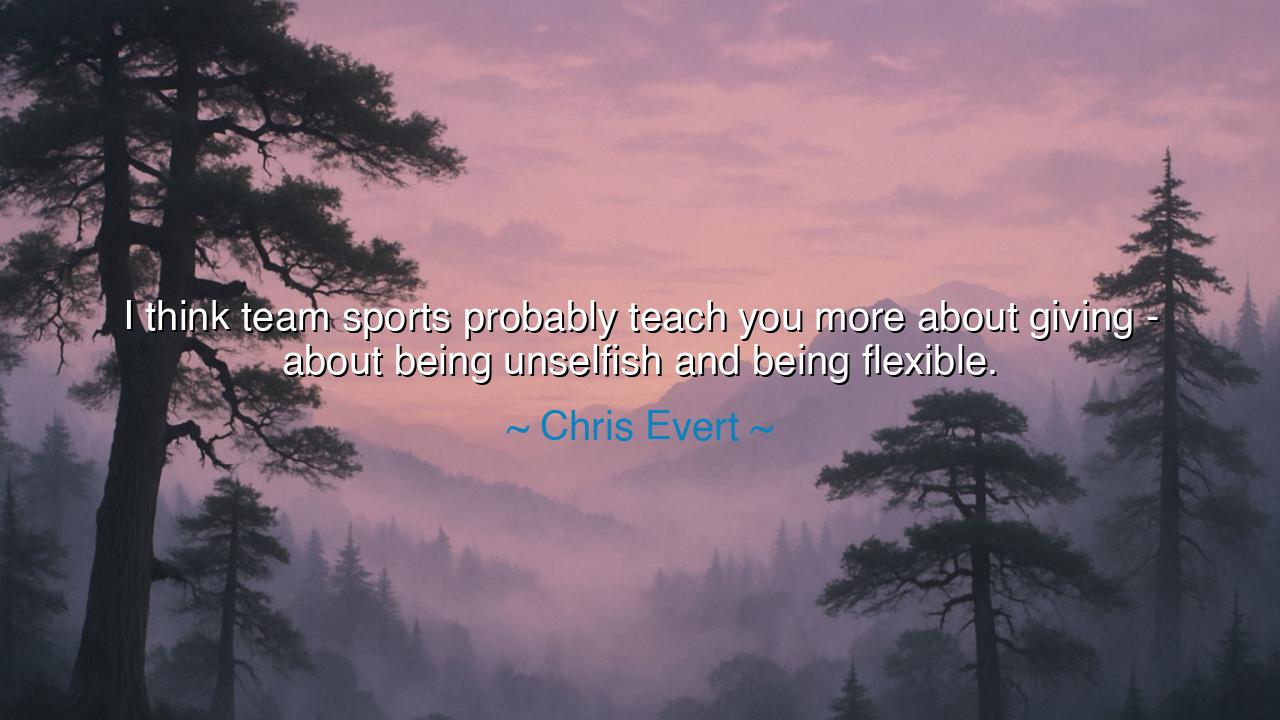
I think team sports probably teach you more about giving - about
I think team sports probably teach you more about giving - about being unselfish and being flexible.






In the heart of every great warrior lies the wisdom of sacrifice—of knowing that true strength is not found in self-interest, but in the unity of purpose that binds us to others. Chris Evert, the tennis legend whose name is etched in history, once spoke of this truth when she said, "I think team sports probably teach you more about giving—about being unselfish and being flexible." These words, simple yet profound, reveal a timeless lesson about the essence of teamwork, the heart of sacrifice, and the power of cooperation in achieving greatness.
In the ancient world, warriors were often tested not only by their physical strength but by their ability to work as part of a greater whole. The Greek hoplites, who fought as part of the phalanx formation, were the very embodiment of teamwork. Each soldier stood shoulder to shoulder with his comrades, and their strength was derived not from individual valor alone but from their ability to function as one unified force. The battle was not won by the strongest warrior, but by the one who could sacrifice personal glory for the success of the group. In this way, Evert’s words resonate with the wisdom of those ancient times—true strength is not the strength of the individual, but of the collective.
Consider the story of the great leader and general, Alexander the Great, whose triumphs were not only due to his strategic genius but to his understanding of leadership and unity. Alexander understood that the success of his empire depended not on his own singular efforts but on the loyalty and sacrifice of his soldiers. He inspired them to give of themselves, to be unselfish in the pursuit of a common goal. Through his leadership, Alexander cultivated an army where every man understood that his strength mattered not in isolation, but in how it contributed to the greater whole. This is the very essence of what Evert speaks of—a deep understanding that to achieve greatness, one must learn the art of giving, of sharing, and of working together.
Evert’s reflection also speaks to the profound concept of flexibility. In team sports, as in life, the greatest victories are not won by rigid adherence to one’s own desires, but by the willingness to adapt, to bend, to mold oneself to the needs of the group. The Roman legions, those mighty warriors who conquered vast lands, were famed not only for their strength but for their ability to adapt to any terrain, any challenge. Their success came from their flexibility, from their ability to bend without breaking. In the same way, Evert reminds us that true strength lies in being flexible, in adapting to the needs of the team and understanding that personal triumphs are hollow without the success of the whole.
The lesson here, dear ones, is clear and timeless: to be part of something greater than oneself requires not just strength, but humility, sacrifice, and adaptability. In all things—whether in sports, in leadership, or in life itself—true greatness is found in the ability to give, to be unselfish, and to be flexible. The greatest leaders, the greatest warriors, are those who understand that their power is not their own; it is shared, it is built upon the strength of those around them. Just as the phalanx was invincible when every soldier sacrificed his own desires for the success of the unit, so too can we achieve greatness when we sacrifice for others, when we work together for the greater good.
Let us take this wisdom to heart in our own lives. In every endeavor, in every challenge, we must ask ourselves: how can I contribute to the success of the whole? How can I give, how can I be flexible, how can I adapt to ensure that we all rise together? Whether in our work, in our communities, or in our relationships, the lesson remains the same: it is not enough to seek individual glory; we must seek collective success. The true measure of a person’s strength is not in what they achieve alone, but in what they help others achieve alongside them.
So, let us be warriors of unity, of humility, and of sacrifice. Let us remember the wisdom of those who have come before us, from the Greek hoplites to the mighty legions of Rome, and understand that the greatest strength lies not in standing alone but in standing together. By embracing this lesson—by learning the art of giving, of being unselfish, and of being flexible—we will not only achieve greatness ourselves but will elevate those around us, creating a legacy of strength that is greater than any individual victory.






AAdministratorAdministrator
Welcome, honored guests. Please leave a comment, we will respond soon